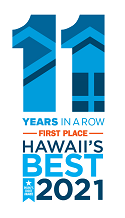
Make it a Point to Ask About Points
When inquiring about rates, ask if the interest rate quoted requires the payment of "points." Many loan programs allow you to receive a lower interest rate by paying a fee in points. One point equals 1% of the loan amount, and the more points you can or wish to pay, the more you can lower your interest rate. Paying points is not a requirement; it’s just an option that lenders offer to accommodate the immediate or long-term monthly payment concerns of home loan customers.
Annual Percentage Rate (APR) is Key
When shopping for a home loan, make sure to ask lenders for the annual percentage rate (APR) and the interest rate, so you can compare the cost of the loan accurately to other available home loan rates. The APR adds in the other costs required to make the loan to the interest rate (which determines the amount of your monthly payment). The APR also determines your loan’s total finance charge, expressed as a percentage over the scheduled life of the loan. After you apply for your home loan, you will receive a Truth-in-Lending Statement. Homeowners sometime find this document confusing because it states the APR only, and not the interest rate.
The APR reflects the true cost of a mortgage loan over its full scheduled term as a yearly rate because, in addition to the rate of interest charged on the loan, the APR includes certain other prepaid finance charges. These charges may include origination fees, loan discount points, private mortgage insurance premiums and the estimated interest (prorated from closing date to the month's end).
The example below assumes $1,000 in additional finance costs and a $300,000 loan. Certain closing costs may also be charged that are not included in this calculation.
Example Interest Rate and APR Comparison:
30-Year Fixed-Rate Mortgage
- Interest Rate: 4.000%
- Total Points: 1
- APR: 4.133%
30-Year Fixed-Rate Mortgage
- Interest Rate: 3.875%
- Total Points: 2
- APR: 4.233%
In this example, the loan with lower interest rate would be the more expensive option when the total points are also considered.
Locking or Floating
A lock gives you a specified period of time—typically from 30 to 60 days—of protection from increases in interest rates.
If you choose to float your interest rate, then your rate will fluctuate with the market. The benefit to floating is that you would have the option of locking at a lower level if interest rates decrease. The risk, of course, is that you would face a higher interest rate if interest rates rise before you lock.
Generally, you’ll be able to lock once you have found a property and have an accepted offer. When you lock, make sure the lock period allows enough time for your loan to be processed. If your lock period expires before your transaction closes, your interest rate may be adjusted to reflect current market conditions.
Some loan programs allow a one-time float down option that can be used during the rate-lock period. The one-time float down allows you to seek a lower rate should rates drop while your loan is locked, if you qualify.
No one knows if rates will rise or fall, so it’s impossible for a home loan consultant to tell you whether or not you should lock or float your loan. The decision is yours. For more information on home loans ask your Locations agent for the name of a Hawaii Mortgage Group loan originator (LO) who will explain all of the terms of the home loan and give you the most current interest rate information.










